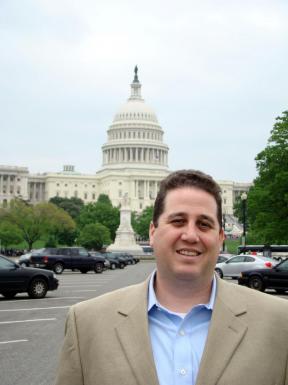Written by Suneethi Sivakumaran, postdoctoral fellow
Vanderbilt alumni provide a wealth of information through their experiences. Dr. Michael Holinstat is a Vanderbilt alumnus who shared his experiences and thoughts to help Ph.D. students and postdoctoral fellows to plan their journey ahead. At present, he is an assistant professor of Medicine and Biochemistry at Thomas Jefferson University. He was awarded the Kenneth M. Brinkhous young investigator prize in Thrombosis in 2012.
 Suneethi: It is exciting for a postdoctoral fellow to think about the prospect of becoming an assistant professor. Could you please share with us your journey from a postdoctoral fellow to your current position of an assistant professor?
Suneethi: It is exciting for a postdoctoral fellow to think about the prospect of becoming an assistant professor. Could you please share with us your journey from a postdoctoral fellow to your current position of an assistant professor?Dr. Holinstat: I was at the right place at the right time. I was involved in a good project as a postdoctoral fellow, and it helped me receive a NRSA fellowship within few months of joining Vanderbilt University. I succeeded in getting a K99 award in two and a half years of being a fellow. These awards and publications helped me in getting an academic job.
As a postdoctoral fellow, did you plan to be in academics or were you open to more options?
Dr. Holinstat: I was completely open to other options. Though I started looking for a job early, the K99 award and my strong publication record helped me in getting an academic job.
In your opinion, is it necessary for postdoctoral fellows to set goals for one year or five years and be focused on it rather than just focus on publishing and look for a job later?
Dr. Holinstat: Though publications play a major role, it is equally important to set annual goals through BRET’s Individual Development Plan. This is necessary irrespective of one’s interest in academics or alternative career. It is necessary to have 5-year and 10-year plans and evaluate these plans every 6 months.
Most postdoctoral fellows focus on their research and do not network much. What are your thoughts about it?
Dr. Holinstat: Networking is essential. Most of the time, faculty positions are not advertised but filled through networking. Postdoctoral fellows may network within the university, but this is not sufficient. One needs to go to scientific meetings, conferences, and social events to network outside the university or the department. Network by visiting posters of interest and discussing with the investigator or a scientist about their research.
In addition to networking and other scientific skills, what skills are necessary for postdoctoral fellows to compete nationally for an academic position?
Dr. Holinstat: Communication abilities. When I received the award in Thrombosis in 2012, I had to communicate in front of a couple thousand people. One needs to communicate to others the implications of one’s research work and answer the thought provoking questions in one’s area of research. Second, is the ability to interact with people. This is useful for networking too.
Ph.D. students and postdoctoral fellows give frequent presentations during lab meetings and poster presentations. Are there other options to improve on communication and presentation skills?
Dr. Holinstat: Yes, speaking during lab meetings is good but not enough. Give presentations to people outside your lab. For instance, in my case, I gave a presentation in the seminar series of Grand Rounds for Clinical Pharmacology.
What would be your suggestions/advice to postdoctoral fellows?
Dr. Holinstat: Publish papers, get funding, and add a teaching portfolio to your CV. I taught night classes at Nashville State Community College, and it was an advantage while looking for an academic job.
Most of our conversation revolved around academics. As a research collaborator within industry, please give us a snapshot of the major differences between working in industry and working in academia.
Dr. Holinstat: Industry is a good fit if one likes to work on different projects. Academic research is more focused and has the flexibility in what one likes to do. The returns are profitable in industry, but I would not say there is a huge difference in salary. A new investigator in academics has a 3-5 year contract during which one’s ability could be proven to the NIH with grants obtained. Ultimately, my suggestion is to become a successful postdoc whether one chooses to join industry or academics.
As a final question, if a postdoctoral fellow wants to be in science but is not sure which career path to take, what would be your suggestion?
Dr. Holinstat: First, identify your interests. Read about alternate career paths available and explore options. The American Society for Biochemistry and Molecular Biology (ASBMB) organizes a training day for postdocs to help fellows identify an alternate career path. There is also experimental biology meetings one could attend. Don’t be afraid to talk to people and determine one’s interests.
Dr. Holinstat: As a final note, I am willing to extend any help possible. One could contact me for any objective suggestions or help.
 Suneethi: It is exciting for a postdoctoral fellow to think about the prospect of becoming an assistant professor. Could you please share with us your journey from a postdoctoral fellow to your current position of an assistant professor?
Suneethi: It is exciting for a postdoctoral fellow to think about the prospect of becoming an assistant professor. Could you please share with us your journey from a postdoctoral fellow to your current position of an assistant professor?